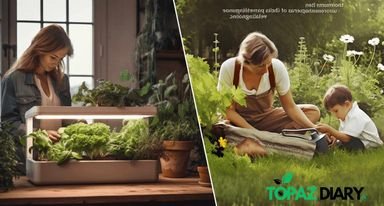Whether indoor gardens are better than outdoor gardens depends on various factors and personal preferences.
Indoor gardens offer greater control over environmental conditions like temperature, humidity, and lighting, making them suitable for growing plants year-round and for cultivating delicate or exotic species. They’re also more accessible and convenient, especially for urban dwellers or those with limited outdoor space.
However, outdoor gardens benefit from natural sunlight and ventilation, which can promote healthier growth and reduce the need for artificial inputs. Additionally, outdoor gardens often provide more space for larger plants or crops and support a broader range of biodiversity. Ultimately, the choice between indoor and outdoor gardening depends on individual needs, resources, and preferences.
Here are some points to consider for both options:

Indoor Gardening:
Climate Control: Indoor gardening allows you to have control over environmental conditions such as temperature, humidity, and light. This can be beneficial if you live in a region with extreme weather conditions or if you want to grow plants that require specific conditions.
Year-round Gardening: With indoor gardening, you can grow plants all year round, regardless of the season. This is particularly useful in areas with short growing seasons or where outdoor gardening is challenging due to harsh weather conditions.
Pest and Disease Control: Indoor gardening reduces the risk of pests and diseases affecting your plants since they are protected from outdoor elements. This can make it easier to maintain the health of your plants and prevent infestations.
Accessibility: Having an indoor garden allows you to easily access your plants, especially if you have mobility issues or live in an apartment or urban area with limited outdoor space. It brings nature closer to you.

Outdoor Gardening:
Natural Sunlight: Outdoor gardening provides access to abundant natural sunlight, which is essential for plant growth. Sunlight is free and provides a full spectrum of light that plants need for photosynthesis.
Space: Outdoor gardening typically offers more space for plants to grow and spread their roots. It allows you to grow larger plants, trees, and shrubs that may not be suitable for indoor spaces.
Pollinators and Beneficial Insects: Outdoor gardens attract pollinators like bees and butterflies, which play a crucial role in pollinating flowers and ensuring fruit production. Beneficial insects can also help control pests naturally.
Variety of Plants: Outdoor gardening allows you to grow a wider range of plants, including those that require larger spaces or specific outdoor conditions, such as certain fruits, vegetables, and ornamental plants.
Ultimately, the choice between indoor and outdoor gardening depends on your specific needs, available space, climate, and personal preferences. Some people even combine both approaches, utilizing indoor gardening for certain plants and outdoor gardening for others.

